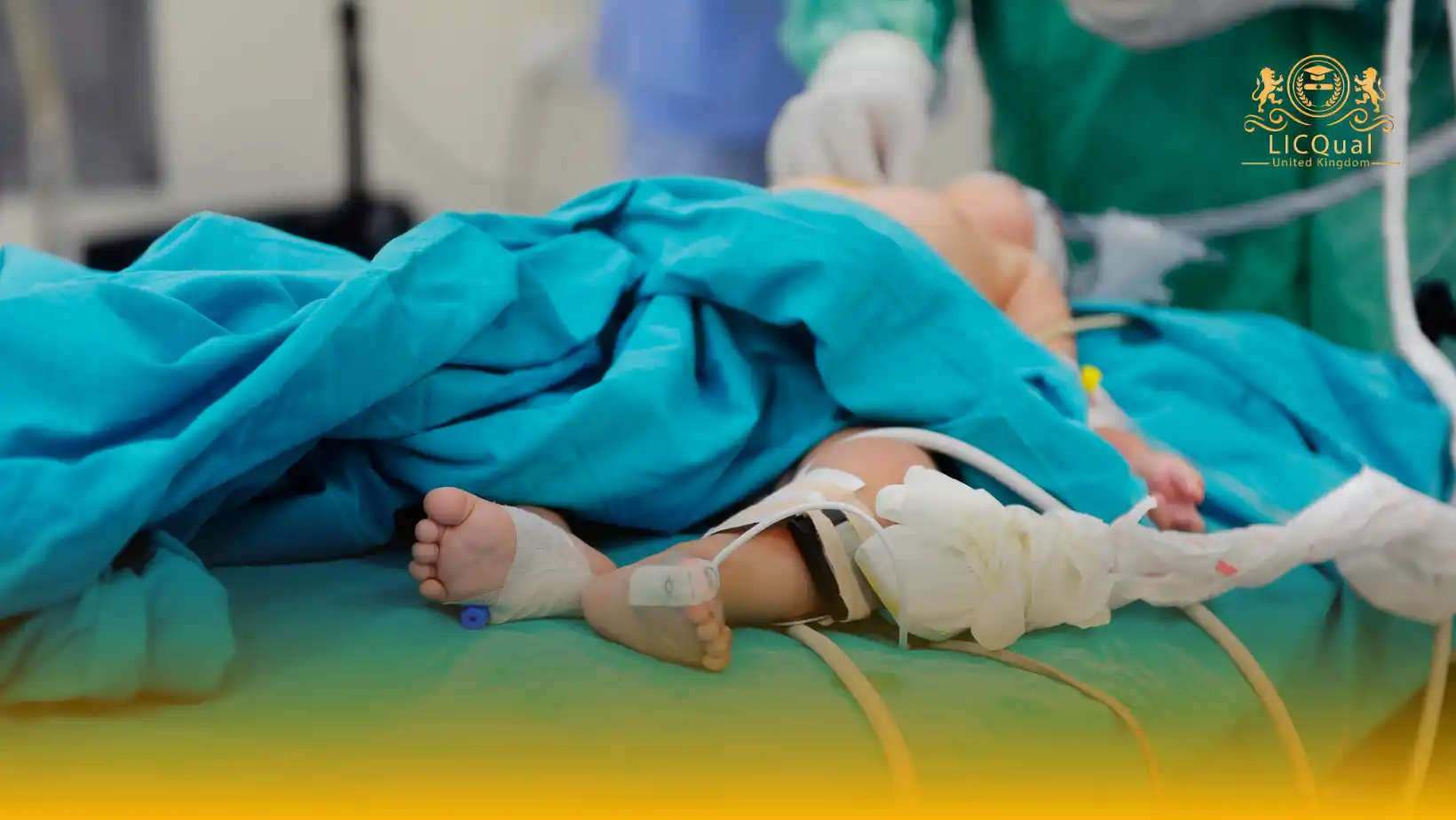The LICQual Level 6 Diploma in Pediatric Surgery (Dip PS) is an advanced qualification specifically designed for medical professionals, surgeons, and clinicians who wish to specialise in the surgical care of infants, children, and adolescents. This diploma is not intended for fresh candidates; it is aimed at experienced healthcare professionals who wish to enhance their career prospects, expand their specialised knowledge, and strengthen their Continuing Professional Development (CPD).
Learners undertaking this programme will gain comprehensive expertise in the principles, techniques, and clinical management of pediatric surgical conditions. The course covers congenital anomalies, trauma management, neonatal surgery, minimally invasive procedures, post-operative care, and advanced decision-making in complex cases. Learners will also develop the skills required to assess paediatric patients, plan and perform surgical interventions safely, and apply evidence-based practices to optimise patient outcomes.
Centres delivering the LICQual Level 6 Diploma in Pediatric Surgery are required to maintain the highest standards of training. This includes employing competent and qualified staff, providing access to up-to-date learning resources, and ensuring all necessary clinical facilities and surgical equipment are available to support learner success. Such infrastructure guarantees a rigorous, practical, and engaging learning environment, allowing learners to apply theoretical knowledge in real-world paediatric surgical settings.
By completing this diploma, learners will enhance their professional credibility, contribute effectively to pediatric surgical teams, and improve patient care. Whether aiming to deepen clinical expertise, assume leadership roles, or engage in research and innovation, this qualification equips learners with the advanced knowledge, skills, and professional recognition necessary to achieve their goals in pediatric surgery.
Course Overview
Qualification Title
LICQual Level 6 Diploma in Pediatric Surgery (Dip PS)
Total Units
6
Total Credits
120
GLH
480
Qualification #
LICQ2200950
Qualification Specification
To enroll in the LICQual Level 6 Diploma in Pediatric Surgery (Dip PS), applicants must meet the following criteria:
|
Qualification# |
Unit Title |
Credits |
GLH |
|---|---|---|---|
|
LICQ2200950-1 |
Foundations of Pediatric Surgery |
20 |
80 |
|
LICQ2200950-2 |
Preoperative Assessment and Diagnostic Techniques |
20 |
80 |
|
LICQ2200950-3 |
Surgical Procedures in Pediatrics |
20 |
80 |
|
LICQ2200950-4 |
Postoperative Care and Complication Management |
20 |
80 |
|
LICQ2200950-5 |
Research, Evidence-Based Practice, and Innovation in Pediatric Surgery |
20 |
80 |
|
LICQ2200950-6 |
Professional Practice and Continuing Development in Pediatric Surgery |
20 |
80 |
By the end of this course, learners will be able to:
Unit 1: Foundations of Paediatric Surgery
By the end of this unit, learners will be able to:
- Critically evaluate the unique anatomical and physiological features of infants and children.
- Analyse the presentation and management of congenital and acquired paediatric surgical conditions.
- Demonstrate a clear understanding of the ethical and legal responsibilities in paediatric surgical practice.
- Assess the contribution of paediatric surgery to overall child health and long-term wellbeing.
Unit 2: Preoperative Assessment and Diagnostic Techniques
By the end of this unit, learners will be able to:
- Perform comprehensive preoperative assessments specific to paediatric patients.
- Interpret diagnostic imaging, laboratory investigations, and specialised tests to inform surgical decision-making.
- Evaluate risk factors and comorbidities that influence paediatric surgical planning.
- Apply critical thinking to select appropriate diagnostic and assessment approaches.
Unit 3: Surgical Procedures in Paediatrics
By the end of this unit, learners will be able to:
- Demonstrate advanced knowledge of common and complex paediatric surgical procedures.
- Critically evaluate operative techniques for congenital anomalies, trauma, and neonatal surgical conditions.
- Assess the application and benefits of minimally invasive and laparoscopic approaches in paediatric surgery.
- Apply evidence-based guidelines to improve surgical safety and outcomes in children.
Unit 4: Postoperative Care and Complication Management
By the end of this unit, learners will be able to:
- Design and implement effective postoperative care plans tailored to paediatric patients.
- Recognise and manage complications commonly encountered after paediatric surgery.
- Apply advanced pain management, nutritional support, and rehabilitation strategies.
- Integrate family-centred care principles into postoperative recovery to improve outcomes.
Unit 5: Research, Evidence-Based Practice, and Innovation in Paediatric Surgery
By the end of this unit, learners will be able to:
- Critically analyse current research and emerging innovations in paediatric surgery.
- Design and conduct clinical audits or projects to improve surgical outcomes.
- Apply evidence-based principles to enhance paediatric surgical decision-making.
- Evaluate the impact of research and innovation on patient care and clinical practice standards.
Unit 6: Professional Practice and Continuing Development in Paediatric Surgery
By the end of this unit, learners will be able to:
- Demonstrate professionalism, leadership, and ethical responsibility in paediatric surgical practice.
- Apply governance frameworks and professional standards in clinical environments.
- Engage in reflective practice and Continuing Professional Development (CPD) to maintain competence.
- Develop leadership and teamwork strategies to contribute to high-quality surgical services.
The LICQual Level 6 Diploma in Pediatric Surgery (Dip PS) is designed for healthcare professionals seeking to advance their skills in child surgery and pediatric clinical care. This course is ideal for surgeons, doctors, nurses, and allied health practitioners who want to gain specialized knowledge, practical expertise, and professional recognition in pediatric surgery. Whether your goal is to manage complex surgical cases, improve patient outcomes, or pursue leadership roles, this Level 6 Pediatric Surgery Diploma equips you with the expertise to excel.
Surgeons and Medical Practitioners
- Pediatric surgeons aiming to enhance surgical expertise
- General surgeons specializing in child surgery
- Doctors managing complex pediatric conditions
- Professionals performing evidence-based surgical interventions
- Surgeons seeking UK Level 6 recognized certification
- Practitioners aiming to improve clinical skills and patient outcomes
Hospital and Clinical Staff
- Nurses supporting pediatric surgical procedures
- Operating theater staff involved in child surgery
- Anesthetists working with surgical teams for pediatric cases
- Clinicians providing preoperative and postoperative care
- Allied health professionals assisting in pediatric recovery
- Staff seeking practical knowledge and procedural skills
Students and Graduates
- Medical, nursing, and health science students pursuing specialization
- Recent graduates aiming for pediatric surgical roles
- Individuals seeking postgraduate diplomas for career advancement
- Students combining theory with practical surgical applications
- Learners seeking UK Level 6 recognized qualification
- Graduates preparing for professional careers in pediatric healthcare
Career Advancers
- Professionals aiming for promotions in hospitals or pediatric units
- Surgeons seeking leadership or specialized positions
- Clinicians wanting recognized certification to validate expertise
- Healthcare workers targeting advanced responsibilities in pediatric care
- Practitioners aiming to enhance employability and career prospects
- Professionals expanding practical and theoretical pediatric skills
Research and Academic Professionals
- Doctors and surgeons involved in clinical pediatric research
- Academics developing teaching programs in pediatric surgery
- Researchers exploring innovative surgical techniques
- Professionals integrating research into clinical practice
- Staff contributing to scientific publications and pediatric studies
- Individuals pursuing academic and clinical growth simultaneously
Clinical Practitioners
- Surgeons managing pediatric surgical cases
- Clinicians performing complex interventions in children
- Professionals providing perioperative and postoperative care
- Healthcare workers implementing evidence-based pediatric procedures
- Practitioners aiming to improve confidence in child surgery
- Professionals integrating modern pediatric surgical techniques into practice
To deliver the LICQual Level 6 Diploma in Pediatric Surgery effectively, centres must maintain high standards of professional expertise, facilities, and learning resources. The following requirements are essential:
- Qualified and Competent Staff: Centres must employ experienced paediatric surgeons, clinicians, and healthcare professionals with recognised qualifications. Staff should be capable of delivering both theoretical knowledge and practical surgical guidance.
- Comprehensive Learning Resources: Centres should provide learners with access to up-to-date textbooks, research publications, clinical guidelines, case studies, and digital learning platforms to support evidence-based practice and advanced learning.
- Clinical and Surgical Facilities: Centres must ensure access to fully equipped paediatric surgical theatres, intensive care units, and clinical environments that allow learners to practice surgical techniques, patient management, and postoperative care.
- Assessment and Evaluation Systems: Centres must implement robust systems for learner assessment, practical evaluations, feedback, and progression tracking to ensure all learners achieve the required competency standards.
- Health and Safety Compliance: Centres are required to adhere to all relevant health, safety, and regulatory standards, ensuring a safe and professional learning environment for all learners.
- Support for Continuing Professional Development (CPD): Centres should actively support learners in CPD activities, reflective practice, and ongoing professional development in paediatric surgery to maintain clinical competence.
Meeting these requirements ensures that learners receive a high-quality, professional, and engaging learning experience, equipping them with the knowledge, skills, and confidence to succeed in advanced clinical, surgical, and leadership roles within pediatric surgery.
Assessment and Verification
All units within this qualification are subject to internal assessment by the approved centre and external verification by LICQual. The qualification follows a criterion-referenced assessment approach, ensuring that learners meet all specified learning outcomes.
To achieve a ‘Pass’ in any unit, learners must provide valid, sufficient, and authentic evidence demonstrating their attainment of all learning outcomes and compliance with the prescribed assessment criteria. The Assessor is responsible for evaluating the evidence and determining whether the learner has successfully met the required standards.
Assessors must maintain a clear and comprehensive audit trail, documenting the basis for their assessment decisions to ensure transparency, consistency, and compliance with quality assurance requirements.







